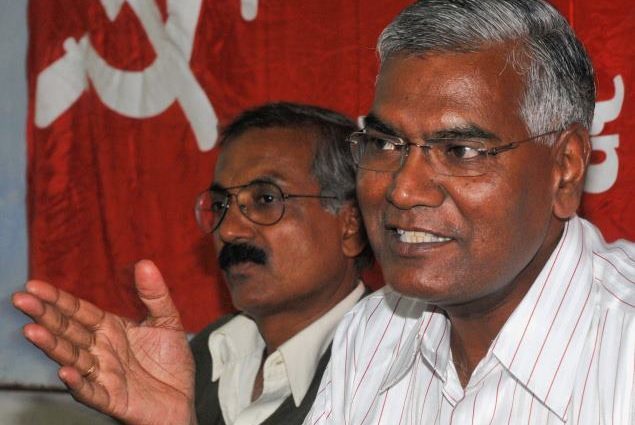New Delhi: The BJP ruled states’ move to promulgate ordinance and executive order to strip millions of workers of their rights could be challenged in court and the option is being considered, Communist Party of India (CPI) General Secretary D Raja has said.
Speaking to Top Lead India, the veteran leader said that workers had earned these rights by sacrificing blood and sweat and hence they cannot be taken away.
“The BJP governments want to subject the working people to all kinds of attacks and treat them as bonded labourers and slaves. This cannot be accepted and, in fact, I am given to understand that either Uttar Pradesh government ordinance or Madhya Pradesh cabinet decisions can be challenged in court. It is under consideration to challenge them in court also,” Raja said.
Terming the decisions of Uttar Pradesh, Madhya Pradesh and Gujarat government move as attack on the working class, the CPI leader vowed to launch nationwide protest.
He said that the executive orders to suspend most labour laws except three had been issued even as Centre was already in the process of codifying over 40 labour laws into 4 and one of them had been adopted by the Parliament.
The decision by the BJP-ruled states have come as a shocker to many given that labour laws are very poorly enforced in the country and even those are being thrown out of window. Even academicians and labour law experts are miffed over the decision to dilute labour laws given that welfare or unemployment benefits for workers are non-existent in the country.
Once state governments notify the decision to put the labour laws in abeyance, workers would lose their rights to form unions, bargain with the management for better wages and would be subjected to the draconian hire-and-fire policy.
On plans to stall government moves to dilute labour laws in the country, CPI leader D Raja said that various labour unions have already taken up the issue and would organize countrywide protests.
“At political party’s level, yesterday we sent a joint letter, signed by leaders of CPI, CPI (M), CPI (ML), RSP, Forward Block, RJD, VCK (Viduthalai Chiruthaigal Katchi) from Tamil Nadu, and also signed by Sharad Yadavji. The letter has been sent to the President (of India) asking him to intervene. But it is one part of our plan. The next part, at political level, we will consult more parties and see what we can do under the conditions of lockdown. Maintaining lockdown norms, we can also organize some protests which we will decide in coming days,” Raja told Top Lead India in an exclusive interview.
The UP government this week decided to bring an ordinance to suspend most of the labour laws in the state for three years claiming it will help bring investments and revive the industry impacted by the Coronavirus-induced lockdown.
As many as 38 labour laws have been suspended using the ordinance route and only four laws will continue to be applicable which include Section 5 of the Payment of Wages Act, 1936, Workmen Compensation Act, 1932, Bonded Labour System (Abolition) Act, 1976, and the Building and Other Construction Workers Act, 1996.
“In order to boost existing businesses and attract new investment to the state, certain relaxations will have to be given on a temporary basis. That is why an ordinance called the ‘Uttar Pradesh Temporary Exemption from Certain Labour Laws Ordinance, 2020’ has been introduced in this regard,” the UP government has said.
The MP government has also cleared amendments to the Factories Act, Madhya Pradesh Industrial Relations Act and Industrial Disputes Act. An official statement said that there was need to give various concessions to industries in the next 1,000 days due to the situation arising out of the corona crisis.
The Gujarat government has also substantially diluted labour laws and other BJP-ruled states like Uttarakhand and Himachal Pradesh are likely to follow suit.
The three state governments have decided to put the labour laws in abeyance to arguably support affected industries but the fact is that trade and business need liquidity and revival of consumption demand more than anything else.
While country’s over 6 crore micro, small and medium enterprises (MSMEs) have been waiting for a stimulus package from the Centre, the Modi government is yet to announce any emergency fiscal stimulus.
While the industry has been grappling with Coronavirus crisis, the economy has been suffering for years the Modi government’s most ill-thought and blunderous demonetisation. The faulty implementation of indirect tax reform GST further worsened the economic health of the country.
Even in the six years of its rule with an iron fist, Prime Minister Narendra Modi has failed to lift business sentiment and bridge the trust deficit with industry. No wonder, billionaire industrialists have preferred to invest money elsewhere than within the country. The private investment in the economy remains tepid and does not seem to improve anytime soon given that industrialists would prefer to conserve cash than invest them.
Investments, as measured by gross fixed capital formation, fell 5.16 per cent in October-December quarter of FY20. The GDP has been on steady decline and is now estimated to slip into negative territory in the current financial year.
Also read | Government privatizing airports to help big corporates: D Raja | TLI Exclusive

